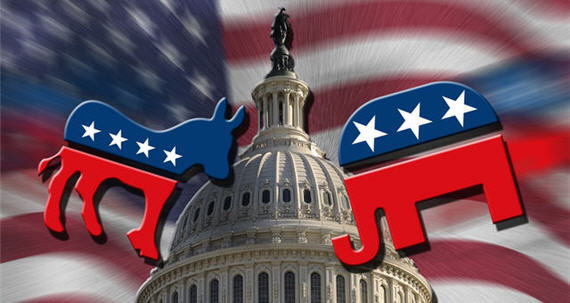Pondering Political Policies and Philosophies

photo courtesy of Google Images
February 16, 2016
Middletown South’s seniors, and even some current juniors, will be able to vote in the upcoming presidential election. Making an educated vote can be intimidating, there is so much information regarding American politics and it seems impossible to comprehend all of it. While ideal, thoroughly understanding every issue on the political agenda isn’t necessary to make an educated vote. An understanding of how your personal philosophies align with the major parties can simplify the process. Whether or not we know it, we all align with a political belief – even if the belief is that there should be no government. Your political alignments often come from the manner in which you were raised, and even genetics. Answer these questions to see how your beliefs translate into American politics.
Social Questions:
- Is Affirmative Action necessary? (Affirmative Action information: https://www.mtholyoke.edu/~jesan20l/classweb/pright.html )
- Yes, it promotes diversity.
- No, it is reverse discrimination.
- What is your opinion on abortion?
- Pro-Choice, a woman has the right to choose.
- Pro-Life, the fetus has the right to live.
- Pro-Choice, the government should not be involved in medical decisions.
- Do you support gay marriage?
- Yes, it is a human right.
- No, it is wrong.
- The government should not be involved in marriage at all.
- Should a business, based on religious beliefs, be able to refuse to serve a customer?
- No, all customers have a right to service.
- Yes, the business owner has the right to refuse service to anyone.
Environment:
- Should the government put regulations on businesses to protect the environment?
- Yes, it is the government’s job to prevent global warming.
- No, global warming is natural, not man-made.
Economics:
- If a person if physically and mentally capable and receiving welfare, should they be required to work?
- No, they should not be forced by the government to work.
- Yes, they should be required to work.
- Should people receiving welfare be subjected to regular drug tests?
- No, this is a waste of time and money.
- Yes, anyone receiving money from the government, including politicians and government employees, should be drug tested regularly.
- Should the federal minimum wage be raised? (More information on this issue: http://wheniwork.com/blog/the-pros-and-cons-of-raising-the-minimum-wage/ )
- Yes, this will decrease poverty and improve the living quality of people working in these positions.
- No, these jobs are meant to develop skills, not support a family, and this will also cause layoffs.
- Do you support increased gun control?
- Yes, stricter background checks and gun ownership laws will reduce gun violence.
- No, the 2nd Amendment gives Americans this right. Do, however, increase penalties for gun-related crimes.
Miscellaneous:
- Should America have universal healthcare?
- Yes, it is a human right.
- No, the free market allows insurance companies to compete, driving down prices.
- How do you feel about the military?
- Military spending should be reduced, peaceful negotiations are more effective.
- Military spending should be increased, other countries have growing militaries and in order to defend our country we need to increase ours to.
- Should the rich be taxed in order to decrease student loans?
- Yes, all students deserve affordable education. This will also decrease the gap between the rich and the poor.
- No, it is a person’s responsibility to earn money to pay for themselves. America’s richest people may leave the country if the majority of their wealth is taxed.
- Should illegal immigrants be deported? (More information on this issue: http://apecsec.org/illegal-immigration-pros-and-cons/ )
- No, our borders should be open. This stimulates the economy and adds diversity.
- Yes, they are a strain on the economy and they take jobs from Americans.
If you answered:
Mostly as: You side most often with liberal policies and philosophies. Liberals believe a large, involved government is necessary to achieve equality. It is the government’s job to solve social problems, protect human rights, and make sure no one is in need. The Democratic Party is the left-leaning major party. Presidents such as Lyndon B. Johnson, Bill Clinton, and Barack Obama ran as Democratic candidates. The candidates currently running for the Democratic nomination are Hillary Clinton and Bernie Sanders.
Mostly bs: You side most often with conservative policies and philosophies. Conservatives believe in personal responsibility, limited government intervention, free markets, individual freedoms, and a strong military. Conservatives believe the government should give people the freedom to pursue their goals, and these philosophies emphasize individual empowerment. The Republican Party is the right-leaning major political party. Presidents such as Richard Nixon, Ronald Reagan, and George Bush held office as Republicans. The candidates currently running for the Republican nomination are Donald Trump, Ted Cruz, Marco Rubio, Dr. Ben Carson, Jeb Bush, John Kasich, Carly Fiorina, Chris Christie, and Jim Gilmore.
Mostly bs and cs: You side most with right-wing parties that emphasize have less religious motivation than the Republican Party, while still insisting on very limited government intervention. The Libertarian Party reflects these beliefs.
Mixed: Did you get a nearly even mix of answers? You may be a fiscal conservative and a social liberal, meaning you agree with conservative economics and liberal social policies. You could be a fiscal liberal and a social conservative, or you could disagree with both parties on most things. Many Americans fit into this category, classifying themselves as Independents, not aligning themselves with a political party.

